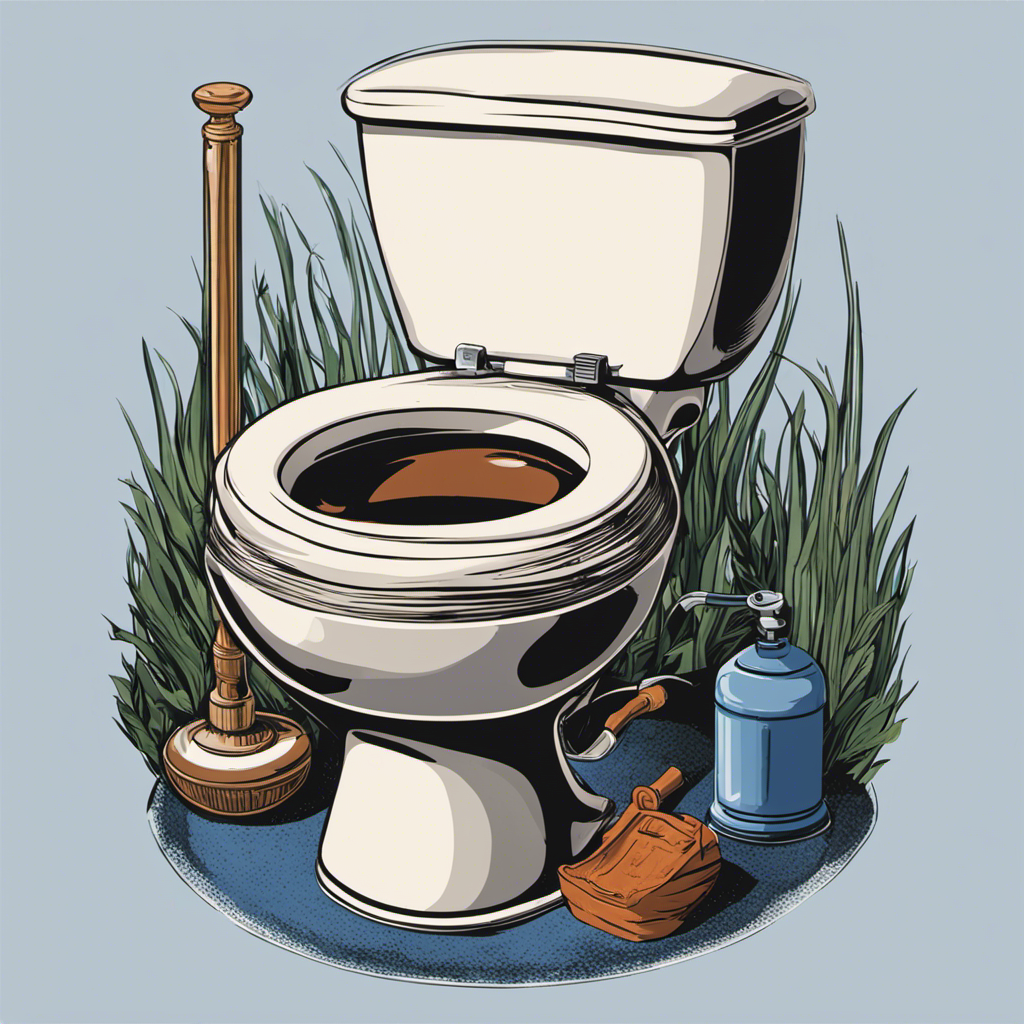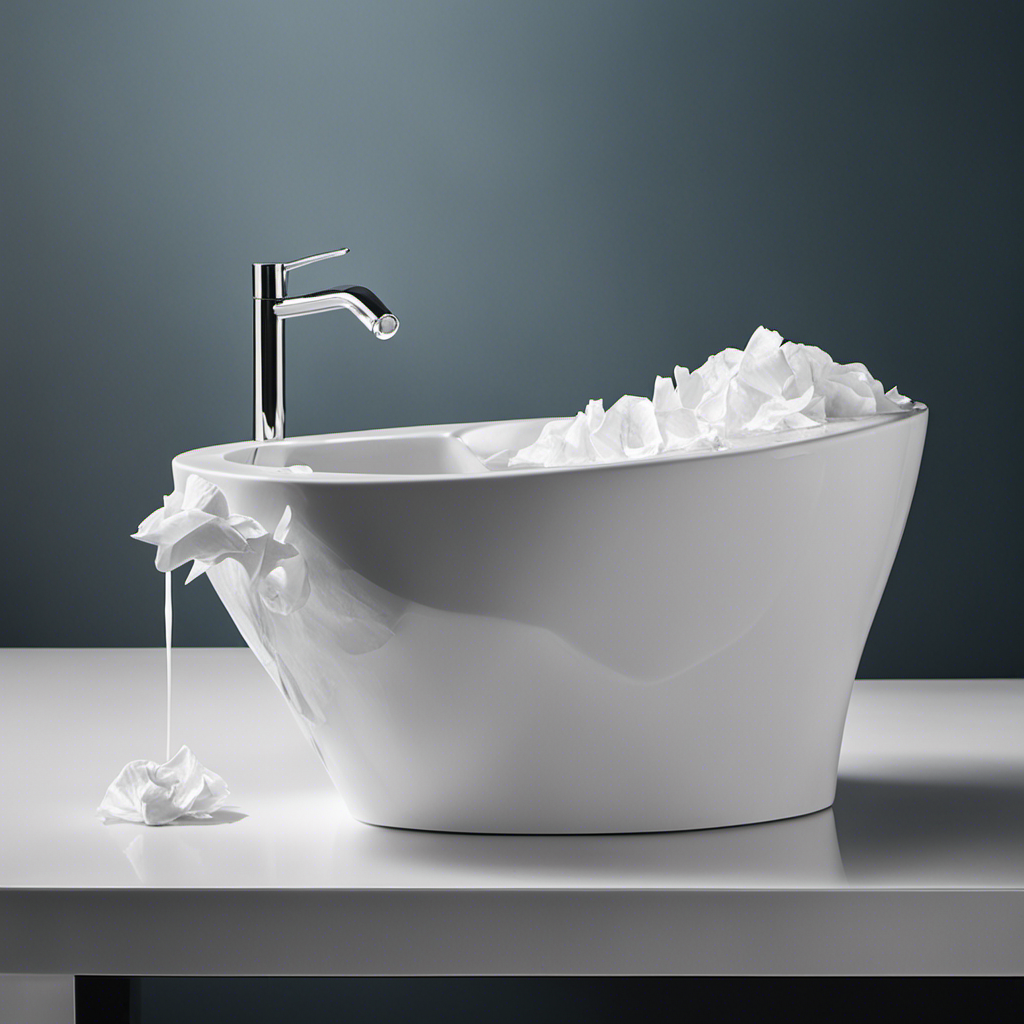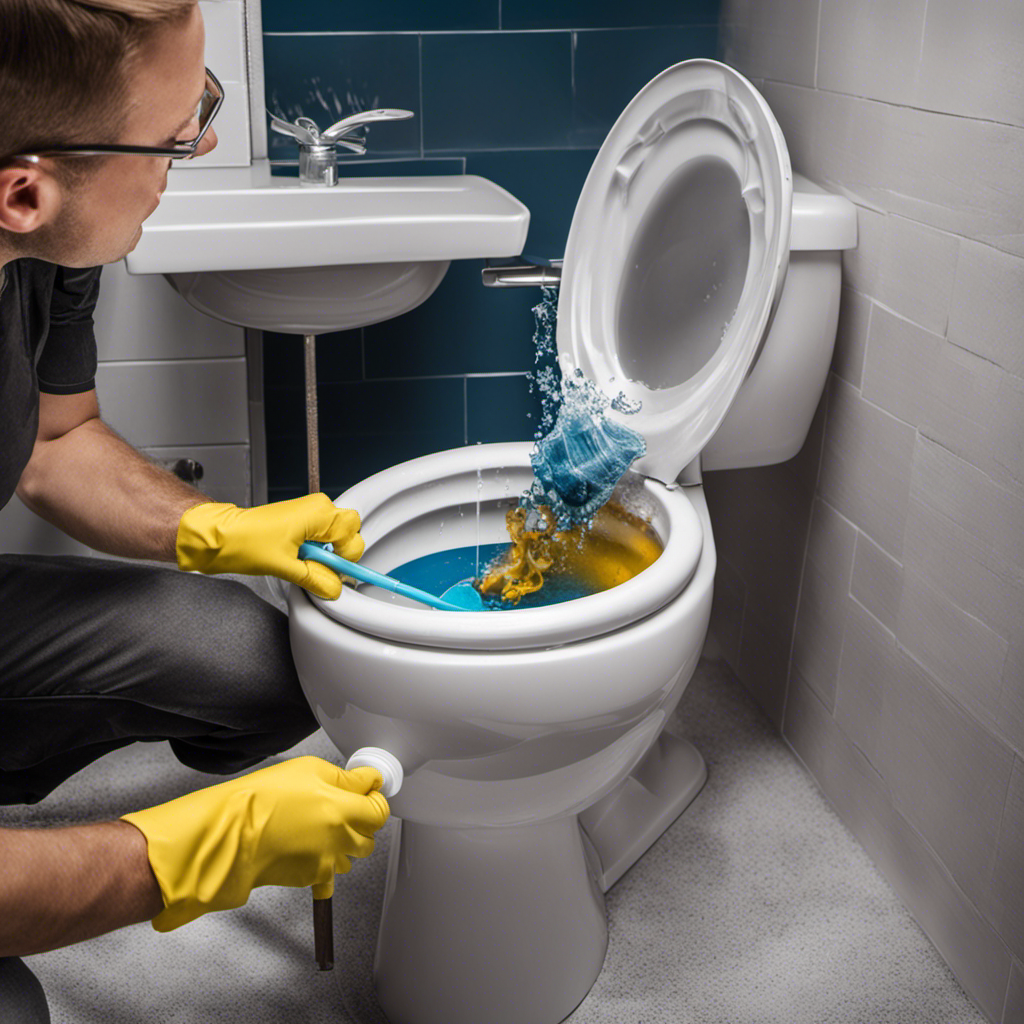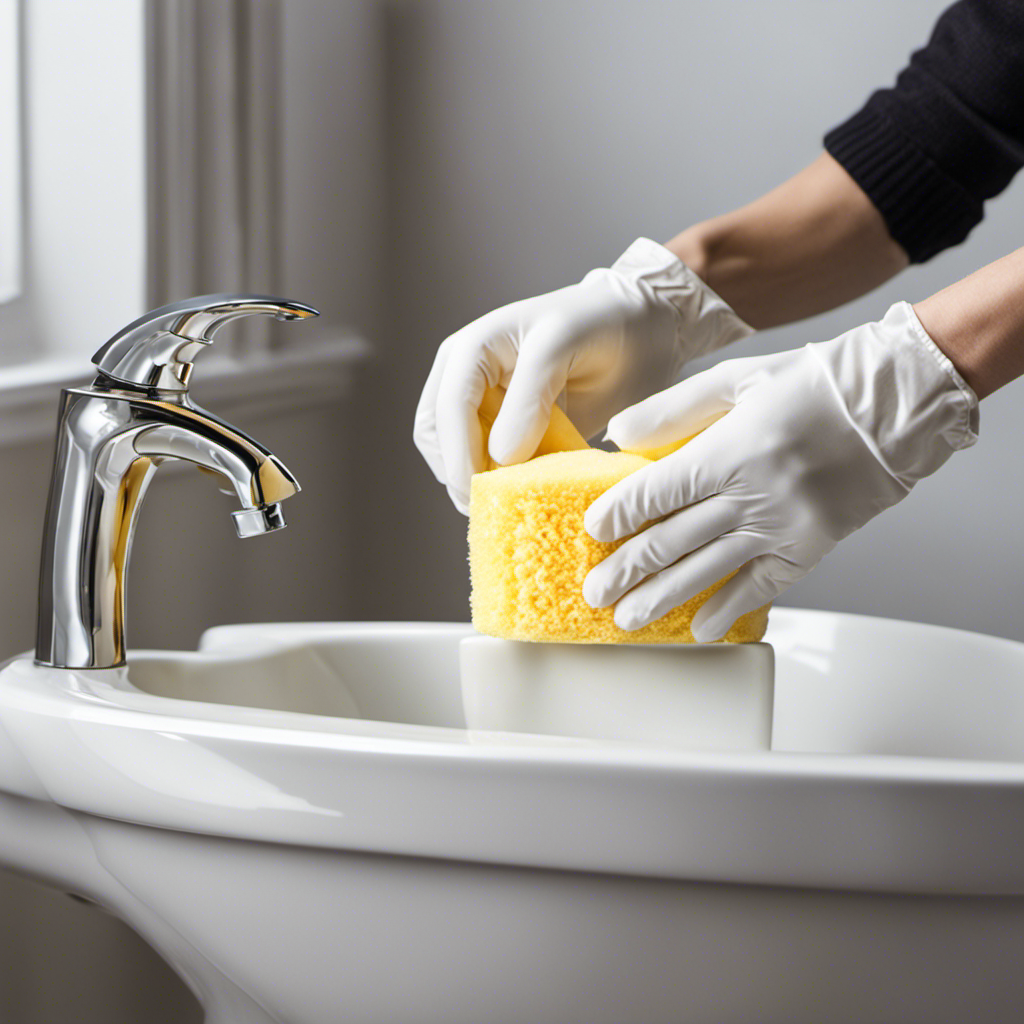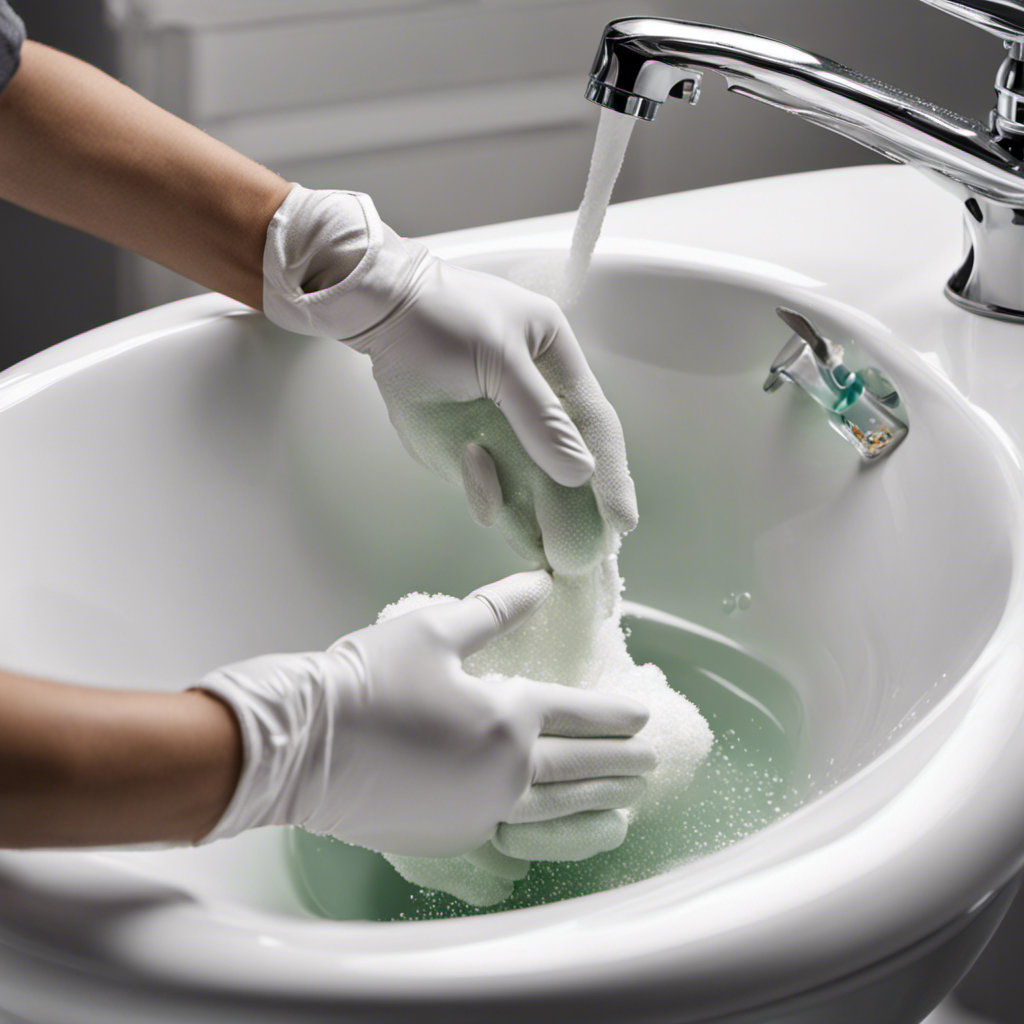Guides
How to Unclog Toilet With No Plunger
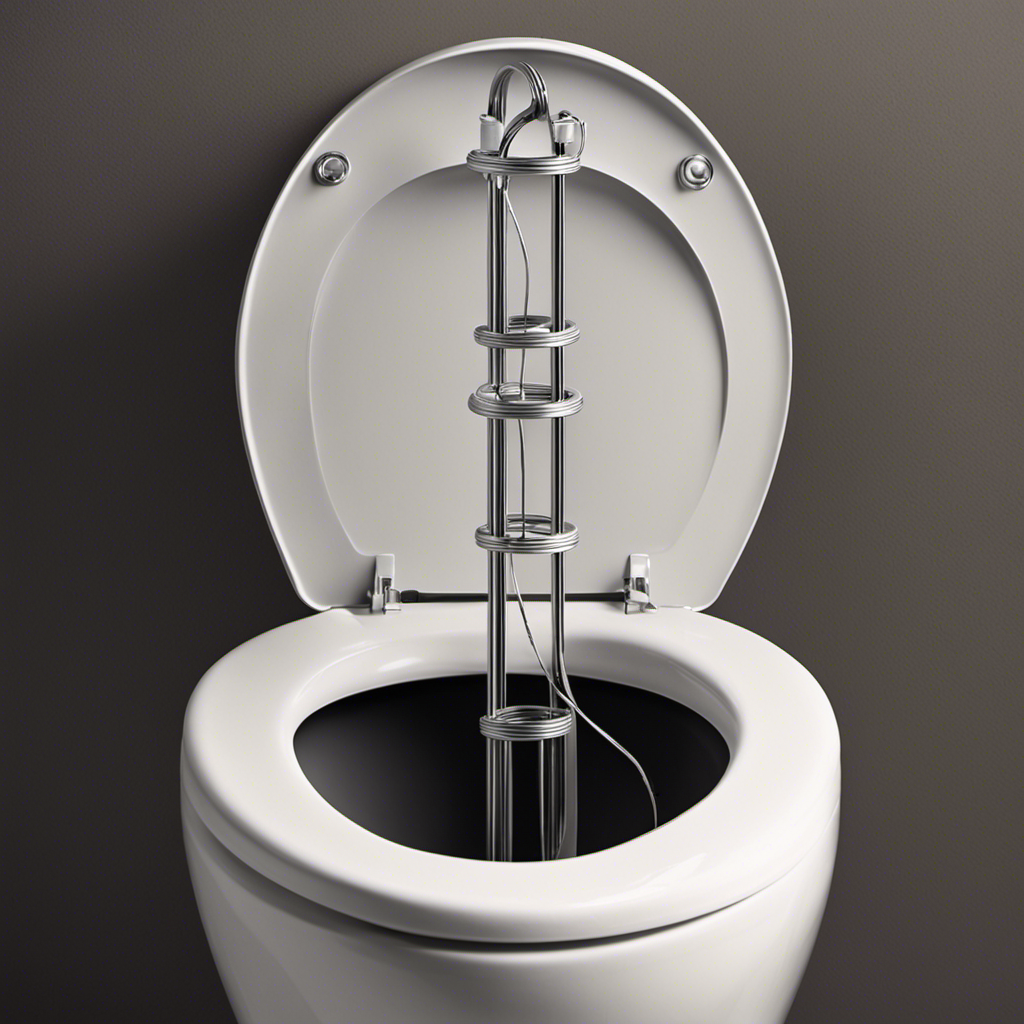
Hey there!
Have you ever found yourself in a sticky situation with a clogged toilet and no plunger in sight? Well, fear not! I’m here to share some handy techniques to help you unclog your toilet without the need for a plunger.
In this article, I’ll guide you through various methods, including the hot water method, the baking soda and vinegar technique, and even using a wire hanger or plumbing snake.
So, let’s dive right in and get your toilet back in working order!
Key Takeaways
- Assess the severity of the clog by observing the water level and drainage.
- Gather necessary tools and materials such as rubber gloves, hot water, a toilet brush or wire coat hanger, and dish soap.
- Try unclogging methods like using hot water, baking soda and vinegar, a wire hanger or plumbing snake, or a wet/dry vacuum.
- If DIY methods fail, consider calling a professional plumber to prevent further damage and costly repairs.
Assess the Severity of the Clog
You should start by checking how severe the clog is. Assessing the clog severity is essential in determining the most suitable unclogging method.
First, observe the water level in the toilet bowl. If it is near the rim or overflowing, the clog is severe.
Next, flush the toilet to see if the water drains properly. If it doesn’t, the clog is likely deep within the pipes.
If the water drains slowly but doesn’t overflow, the clog may be less severe. In such cases, alternative unclogging methods can be effective. These methods include using dish soap and hot water, a wire coat hanger, or a wet/dry vacuum.
Once you have assessed the severity, you can move on to gather the necessary tools and materials for unclogging the toilet.
Gather Necessary Tools and Materials
To get started, gather all the necessary tools and materials for unclogging the toilet without using a plunger. When it comes to natural remedies and DIY solutions, it’s important to have everything ready before attempting to fix the clog.
First, you’ll need a pair of rubber gloves to protect your hands from any potential mess.
Next, grab a bucket and a large jug of hot water. The hot water will help break down any blockages in the pipe.
Additionally, you’ll need a toilet brush or a wire coat hanger to manually remove the clog if necessary.
Lastly, keep a bottle of dish soap handy as it can act as a lubricant to help loosen the blockage.
With these tools and materials, you’ll be ready to tackle the clog head-on.
Use the Hot Water Method
Using the hot water method with a large jug of hot water is a simple and effective way to break down blockages in the pipe. I have found this method to be quite successful in unclogging toilets without the need for a plunger. To ensure safety and avoid any mishaps, it is important to follow certain precautions when using hot water for unclogging purposes.
- Make sure the water is not boiling hot, as it can potentially damage the toilet bowl or pipes.
- Use a sturdy and heat-resistant container to hold the hot water, such as a plastic jug or bucket.
- Pour the hot water slowly and steadily into the toilet bowl, aiming for the center of the blockage.
If the hot water method doesn’t work for you, there are a few alternative unclogging methods you can try.
- Using a toilet auger or snake to manually break up the blockage.
- Using a mixture of baking soda and vinegar to create a chemical reaction that can dissolve the clog.
- Contacting a professional plumber if the blockage persists or if you’re unsure about handling the situation yourself.
Try the Baking Soda and Vinegar Technique
When faced with a clogged toilet and lacking a plunger, one effective solution is to try the baking soda and vinegar technique.
This method relies on a chemical reaction between the two ingredients to unclog the toilet, making it a natural and environmentally-friendly alternative to using a plunger.
With simple ingredients that are commonly found in most households, this technique offers a convenient and cost-effective solution to a clogged toilet.
Chemical Reaction Unclogs Toilet
You can easily unclog your toilet using a chemical reaction. Instead of relying on a plunger, there are alternatives that can effectively clear the blockage.
One popular method is to use a combination of baking soda and vinegar, which creates a powerful reaction that can break down the clog. Here’s how it works:
- Pour one cup of baking soda into the toilet bowl.
- Slowly add one cup of vinegar to the bowl.
- Allow the mixture to sit for about 30 minutes.
- Flush the toilet to see if the clog has cleared.
This chemical reaction creates a bubbling effect that helps to dislodge and dissolve the blockage. It’s important to note that this method may not work for all types of clogs, particularly those caused by large objects or excessive waste. In such cases, it’s best to consult a professional plumber for assistance.
Natural Alternative to Plunger
If you’re in a bind and don’t have a plunger, there’s a natural alternative that can help clear your clogged toilet. Natural remedies are a DIY toilet unclogging solution that can effectively tackle the problem without the need for harsh chemicals or expensive tools.
One simple and effective solution involves a combination of two common household ingredients: baking soda and vinegar. To begin, pour about one cup of baking soda into the toilet bowl. Next, slowly add one cup of vinegar. The mixture will create a chemical reaction, causing bubbles and fizzing.
Allow the solution to sit for about 30 minutes to an hour. Finally, flush the toilet to see if the clog has been cleared. This natural alternative is a safe and cost-effective way to unclog your toilet without a plunger.
Simple Ingredients, Effective Solution
Using just baking soda and vinegar, a simple mixture can effectively clear clogs in your toilet without the need for a plunger. This simple solution provides a quick fix to a common household problem.
Here’s how it works:
- Pour one cup of baking soda into the toilet bowl.
- Follow it with two cups of vinegar.
- Let the mixture sit for about 30 minutes.
- The chemical reaction between the baking soda and vinegar creates a fizzy foam that helps break down the clog.
- After 30 minutes, flush the toilet to see if the clog is cleared.
- If necessary, repeat the process until the clog is completely cleared.
This method is not only effective but also environmentally friendly, as it doesn’t involve the use of harsh chemicals. It’s a simple and affordable alternative to using a plunger, providing a quick fix for toilet clogs.
Use a Wire Hanger or Plumbing Snake
To unclog a toilet without a plunger, start by using a wire hanger or plumbing snake. When it comes to wire hanger alternatives, a plumbing snake is a reliable option.
A plumbing snake, also known as a drain auger, is a long, flexible tool designed to remove clogs from drains and pipes. Its benefits are numerous.
Firstly, a plumbing snake can reach deep into the toilet drain, ensuring effective removal of the blockage. Secondly, it has a spiral-shaped end that grabs onto the clog, allowing you to pull it out easily. Lastly, a plumbing snake is made of durable materials, making it a long-lasting and cost-effective solution.
Utilize a Wet/Dry Vacuum
When faced with a stubbornly clogged toilet and no plunger in sight, fear not! I have discovered a clever solution using a wet/dry vacuum as a substitute.
By creating a proper seal around the toilet bowl drain, the vacuum can effectively remove the blockage with its strong suction power.
This method is not only efficient but also prevents any potential mess or damage caused by using alternative tools.
Vacuum as Plunger Substitute
If you don’t have a plunger, you can try using a vacuum to unclog the toilet. Although not a traditional method, a wet/dry vacuum can be an effective alternative when faced with a stubborn clog. However, it is important to follow certain precautions to ensure vacuum safety and prevent any damage.
Here are some key points to keep in mind when using a vacuum as a plunger substitute:
- Use a wet/dry vacuum specifically designed for water and debris removal.
- Make sure the vacuum is clean and free from any dirt or debris.
- Attach a suitable attachment, such as a rubber or plastic nozzle, to create a seal.
- Start with low suction power and gradually increase if needed.
- Avoid using a regular household vacuum cleaner, as it may not be designed for liquid or solid waste.
Effective Toilet Unclogging
Using a wet/dry vacuum can be an effective way to clear stubborn clogs in the bathroom. When it comes to toilet maintenance, prevention measures are crucial. However, clogs can still occur despite our best efforts.
In such cases, a wet/dry vacuum can come to the rescue. To start, ensure that the vacuum is in ‘wet’ mode to handle any water present in the toilet bowl. Next, create a tight seal between the vacuum hose and the drain opening. This will help to create a strong suction and effectively remove the clog. Once the seal is secure, turn on the vacuum and let it do its work.
Remember to never flush the toilet while the vacuum is in use, as it may cause a mess. Regular toilet maintenance and prevention measures can help minimize the occurrence of clogs, but having a wet/dry vacuum handy can provide a reliable solution when clogs become stubborn.
Call a Professional Plumber if All Else Fails
You should definitely consider calling a professional plumber if all else fails to unclog the toilet. While there are many DIY methods to try first, sometimes the blockage is just too stubborn or complex to handle on your own.
Here are a few reasons why calling a plumber is the best solution:
- Experience: Plumbers have the necessary expertise and equipment to efficiently diagnose and fix any toilet clogging issue.
- Safety: Dealing with a clogged toilet can be messy and potentially hazardous, especially if you’re not familiar with the proper techniques and precautions.
- Prevent further damage: Attempting to unclog the toilet yourself can sometimes worsen the problem or cause damage to the plumbing system, leading to more costly repairs in the long run.
Frequently Asked Questions
Can I Use a Plunger if I Have One, or Is It Necessary to Use Alternative Methods?
I can use a plunger if I have one, but it’s not necessary. There are alternative methods to unclog a toilet. Using hot water can be effective, but cold water can also work. Pros and cons depend on the situation.
Can I Use Cold Water Instead of Hot Water for the Hot Water Method?
I wouldn’t recommend using cold water instead of hot water for unclogging toilets. Hot water helps to break down the clog more effectively. However, there are alternative methods to unclog toilets if you don’t have hot water available.
Can I Use Any Type of Vinegar for the Baking Soda and Vinegar Technique?
Yes, I can use any type of vinegar for the baking soda and vinegar technique. However, it’s important to note that different types of vinegar may have different strengths and odors, so it’s best to choose one that suits your preference.
Is It Safe to Use a Wire Hanger or Plumbing Snake in My Toilet Without Causing Damage?
Using a wire hanger or plumbing snake in a toilet can be risky. To avoid damage, exercise caution and follow proper procedures. It’s important to understand the potential risks and take necessary precautions.
Can I Use a Regular Vacuum Instead of a Wet/Dry Vacuum to Try and Unclog My Toilet?
I can use a toilet auger as an alternative method for unclogging a toilet with no plunger. It’s important to be careful and follow instructions to avoid causing any damage.
Conclusion
In conclusion, unclogging a toilet without a plunger may sound daunting, but with the right techniques and tools, it can be a manageable task.
By assessing the severity of the clog and using methods like the hot water technique, baking soda and vinegar combination, or a wire hanger, you can effectively clear the blockage.
If all else fails, don’t hesitate to call a professional plumber for assistance.
Remember, just like a skilled conductor leading an orchestra, you too can master the art of unclogging toilets without a plunger.
With an impeccable eye for detail and a passion for bathroom-related, Ava leads our editorial team gracefully and precisely.
Under her guidance, Best Modern Toilet has flourished as the go-to resource for modern bathroom enthusiasts. In her free time, you might find Ava exploring antique shops and looking for vintage bathroom fixtures to add to her collection.
Guides
The Future of Bathroom Cleaning: How Smart Toilets Are Making Chores Obsolete
Unlock the secrets of smart toilets that are revolutionizing bathroom cleaning, but what other innovations await in the future of hygiene?

Smart toilets are transforming bathroom cleaning, making traditional chores seem obsolete. With self-cleaning features that use water jets and UV light, you won't have to scrub as often. Their touchless operation reduces bacteria, enhancing hygiene and comfort. You'll enjoy personalized experiences with adjustable temperatures and automatic flushing. Plus, these eco-friendly toilets cut down on toilet paper usage and chemical cleaners, saving you money. The future looks even brighter with potential health monitoring and smart home integration on the horizon. If you're curious about what else lies ahead in bathroom technology, there's more to discover.
Key Takeaways
- Smart toilets utilize self-cleaning mechanisms, reducing the need for manual scrubbing and cleaning products.
- Touchless operation through sensors minimizes physical contact, enhancing sanitation and streamlining bathroom routines.
- Built-in bidets and air dryers promote hygiene, eliminating reliance on toilet paper and reducing cleaning tasks.
- Advanced features like automated flushing and customizable settings enhance user experience while maintaining cleanliness effortlessly.
- Future developments may include health monitoring and smart home integration, further simplifying bathroom maintenance.
Technology Behind Smart Toilets
When you think about the future of bathroom technology, smart toilets stand out with their impressive automation features. These toilets not only offer convenience but also enhance hygiene through advanced cleaning mechanisms.
Self-cleaning toilets utilize water jets and UV light to flush waste and sterilize surfaces effectively, eliminating germs and bacteria with ease. Additionally, adopting modern toilet designs can markedly improve efficiency and reduce water usage, which contributes to both environmental sustainability and cost savings regular cleaning prevents buildup and clogs.
You'll appreciate the specialized non-stick coatings in many smart toilets, which inhibit bacterial buildup, reducing the need for harsh cleaning products. This innovative toilet technology minimizes your manual cleaning efforts while ensuring a sanitary environment.
Moreover, the touchless operation enabled by sensor technology allows for automatic flushing and lid opening, further decreasing physical contact and enhancing sanitation. You can also customize your experience by adjusting settings like water temperature and pressure, providing you with a personalized and comfortable bathroom experience.
With these remarkable features, smart toilets are revolutionizing bathroom cleaning, making traditional methods seem outdated. Embracing this technology means you can enjoy a cleaner, more efficient bathroom without the hassle of frequent scrubbing or reliance on chemical cleaning products.
Hygiene and Health Advantages

Smart toilets not only simplify bathroom cleaning but also offer considerable hygiene and health advantages. With their advanced self-cleaning function, these toilets utilize technologies like UV light and water jets to effectively sterilize surfaces. This capability considerably reduces harmful bacteria in your bathroom, creating a healthier environment for you and your family.
Additionally, the implementation of air purifiers can further enhance indoor air quality by filtering out pollutants, which is especially important in enclosed spaces like bathrooms, where humidity can contribute to mold growth and other allergens. This combined approach to cleanliness promotes a healthier living space and complements the importance of air purifiers.
The integrated bidet functions provide a more thorough and gentle cleaning experience compared to traditional toilet paper. This means less skin irritation and enhanced hygiene, which is especially beneficial for individuals with sensitive skin or certain medical conditions.
As you use a smart toilet, the automated flushing and self-cleaning features work continuously to inhibit bacterial buildup, ensuring your bathroom remains sanitary.
Moreover, smart toilets are a game changer for those with mobility issues or recovering from surgery. They minimize the need for manual cleaning and offer hands-free operation, making personal hygiene more accessible.
Comfort and User Experience

In the domain of modern bathrooms, comfort and user experience take center stage with smart toilets. These innovative fixtures offer heated seats and adjustable water temperatures, so you can enjoy a luxurious experience tailored to your preferences. Imagine settling in and feeling the warmth envelop you—it's a level of comfort you won't want to give up.
Additionally, ensuring your dog's comfort is equally important; consider exploring charming female dog names that reflect their personality.
Smart toilets also promote convenience with automated lids that open and close based on your proximity, ensuring a touchless operation. This feature not only enhances sanitation but also adds to your overall comfort during bathroom routines.
Plus, built-in air dryers eliminate the need for toilet paper, providing a hands-free experience that prioritizes both cleanliness and comfort.
With customizable settings, you can adjust water pressure and temperature for bidet functions, creating a personalized cleaning experience that feels just right.
Automatic flushing mechanisms further streamline your time in the bathroom, making it hassle-free and efficient.
Fundamentally, smart toilets transform your bathroom into a sanctuary of comfort and convenience, allowing you to focus on what really matters—your well-being.
Environmental and Economic Benefits
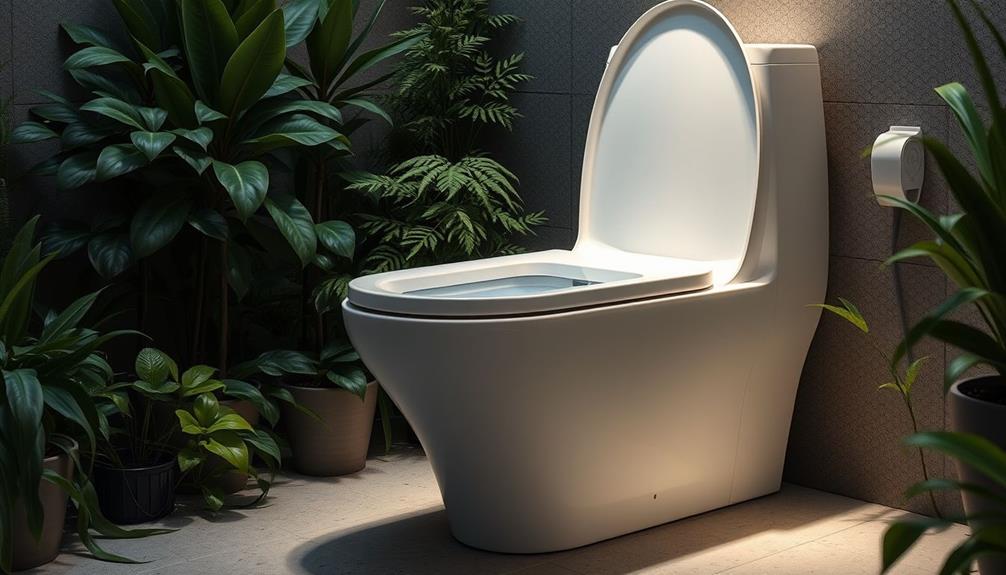
Often overlooked, the environmental and economic benefits of smart toilets are impressive. By considerably reducing the need for toilet paper, these innovative fixtures help conserve trees and lessen the water and energy required for production, promoting environmental sustainability. The advanced self-cleaning technologies, like UV sterilization and water jets, minimize manual cleaning, which cuts down on chemical cleaning products.
Here's a quick comparison of the benefits:
| Environmental Benefits | Economic Advantages |
|---|---|
| Reduces toilet paper usage | Saves money on toilet paper |
| Lowers household water usage | Decreases costs on cleaning supplies |
| Minimizes chemical waste | Long-term savings on utilities |
Smart toilets often feature dual flush systems that lead to considerable reductions in water usage, benefiting both the environment and your utility bills. Plus, the integration of bidet functions enhances hygiene while further reducing the environmental impact of toilet paper waste. When you consider these factors, investing in a smart toilet not only makes sense for your home but also for the planet.
Future Developments in Bathroom Tech
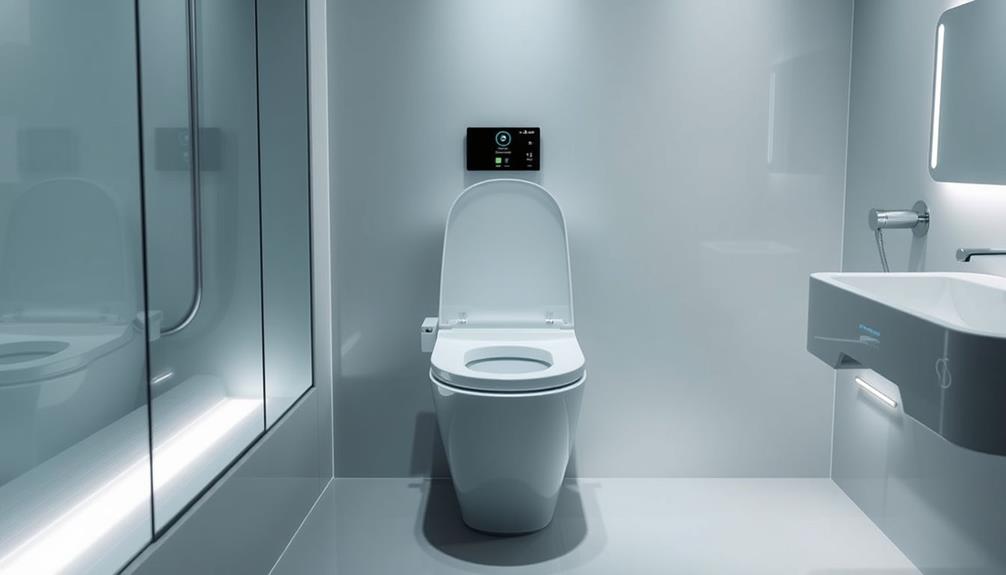
The future of bathroom technology promises to revolutionize your daily routine with innovative features that enhance both health and convenience.
Imagine smart toilets equipped with enhanced health monitoring capabilities, analyzing your waste to provide early detection of health issues like diabetes and kidney disease. These technology advances will empower you to take charge of your health right from your bathroom.
Additionally, integrating Mount Kilimanjaro Weight Loss Guide principles can help you maintain peak health while enjoying the comforts of modern technology.
Further innovations will include advanced sensors and AI that customize your experience, adjusting settings based on your individual preferences and patterns. This means maximum comfort and convenience tailored just for you.
Plus, expect smart toilets to communicate seamlessly with other smart home devices, allowing you to use voice commands for an effortless experience.
Sustainability is also a priority, with research focusing on recycling waste water and using bioprocessing methods to minimize environmental impact.
You'll even see self-cleaning technologies powered by UV light and electrolyzed water becoming more widespread, drastically reducing your manual cleaning efforts.
With these developments on the horizon, the bathroom of the future won't only be smart but also a pivotal part of your health and wellness journey.
Frequently Asked Questions
What Are the Disadvantages of Smart Toilets?
Smart toilets can be costly upfront and require maintenance, which can add to expenses. You might face a learning curve with features, and privacy concerns about health data could also make you hesitant to invest.
Are Smart Toilets Worth It?
Imagine stepping into a clean oasis every time you use the bathroom. Smart toilets are worth it if you value hygiene, comfort, and convenience. You'll save time, money, and enjoy a healthier bathroom experience.
What Is the Future of Toilets?
The future of toilets looks promising, with smart technology enhancing convenience. You'll enjoy features like automated cleaning, water conservation, and health monitoring, making your bathroom experience cleaner, more efficient, and ultimately more enjoyable in daily life.
Do Smart Toilets Clean Themselves?
Imagine a car that washes itself after every drive. Smart toilets do just that! They clean themselves using UV light, automated jets, and special coatings, making your bathroom experience more hygienic and hassle-free.
Conclusion
In the future, smart toilets will redefine your bathroom experience, elevating hygiene, enhancing comfort, and conserving resources. Imagine a world where cleaning becomes effortless, where health is prioritized, and where every visit feels like a spa retreat. As technology advances, these innovations will not only simplify your chores but also promote a sustainable lifestyle. Embrace the change, look forward to the convenience, and enjoy the peace of mind that comes with a smarter bathroom.
With an impeccable eye for detail and a passion for bathroom-related, Ava leads our editorial team gracefully and precisely.
Under her guidance, Best Modern Toilet has flourished as the go-to resource for modern bathroom enthusiasts. In her free time, you might find Ava exploring antique shops and looking for vintage bathroom fixtures to add to her collection.
Guides
Composting Smart Toilets: High-Tech Solutions for Eco-Conscious Homeowners
The future of eco-friendly living starts with composting smart toilets that revolutionize waste management—discover how they can transform your home today!
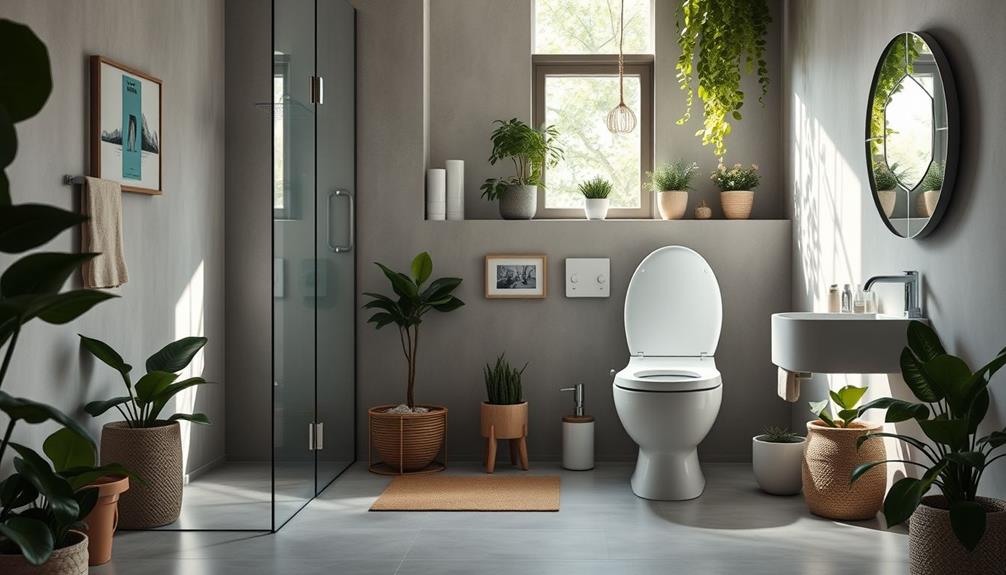
If you're looking for eco-friendly solutions, composting smart toilets are a game changer. These innovative systems convert human waste into nutrient-rich compost using aerobic processes, and they don't require water, drastically cutting your household consumption. They manage odors effectively and can even integrate with smart home technology for peak performance tracking. With various models available, you can choose one that fits your needs and preferences. Plus, upgrading can lead to long-term savings. Explore how these toilets work and find the best option for you to contribute to a greener planet.
Key Takeaways
- Composting smart toilets convert human waste into nutrient-rich compost without using water, promoting sustainable living and reducing water consumption.
- These toilets utilize advanced technology and sensors to monitor waste levels and optimize composting conditions for efficient waste management.
- Odor control is enhanced through waste separation and proper ventilation, creating a hygienic bathroom environment.
- Ideal for off-grid living, these self-contained systems eliminate the need for traditional plumbing and septic systems.
- Investing in composting toilets offers long-term savings on water and waste management while contributing to eco-friendly home solutions.
Understanding Composting Smart Toilets
Understanding composting smart toilets means recognizing how these innovative systems transform waste management. These advanced toilets utilize cutting-edge technology to convert human waste into compost efficiently, employing a combination of aerobic processes and microbial activity.
With no need for water, they considerably reduce household water usage, promoting sustainability and making them ideal for eco-friendly living, especially in off-grid situations. Additionally, similar to using ozone air purifiers, these toilets enhance indoor air quality by managing odors effectively.
Many composting smart toilets come with self-contained systems that include sensors to monitor waste levels and optimize composting conditions. This guarantees effective odor control, so you won't have to worry about unpleasant smells. The efficient design not only enhances waste decomposition but also contributes to an improved user experience.
Moreover, some models integrate seamlessly with smart home technology, allowing you to track performance and maintenance needs remotely. This level of convenience guarantees that your composting toilet operates at its best, making it a practical choice for those committed to eco-friendly solutions.
Benefits of Composting Smart Toilets

Composting smart toilets offer a wealth of benefits that make them an attractive choice for eco-conscious homeowners. By integrating advanced technology into your waste management system, you'll enjoy a range of advantages that contribute to sustainability and a reduced environmental footprint.
These toilets are part of the growing trend towards environmentally friendly waste solutions that promote responsible usage. Here are four key benefits:
- Water Usage Reduction: These eco-friendly toilets operate without water for flushing, drastically cutting down your household's water consumption.
- Efficient Composting: The advanced technology used in composting smart toilets guarantees the effective breakdown of waste into nutrient-rich compost with minimal maintenance.
- Hygienic Solution: By combining waste separation and aerobic composting, these toilets eliminate unpleasant odors, providing a clean and hygienic solution for your bathroom.
- Ideal for Off-Grid Living: Many models are self-contained, making them perfect for off-grid living or homes lacking traditional plumbing systems, giving you flexibility in installation.
How Composting Toilets Function
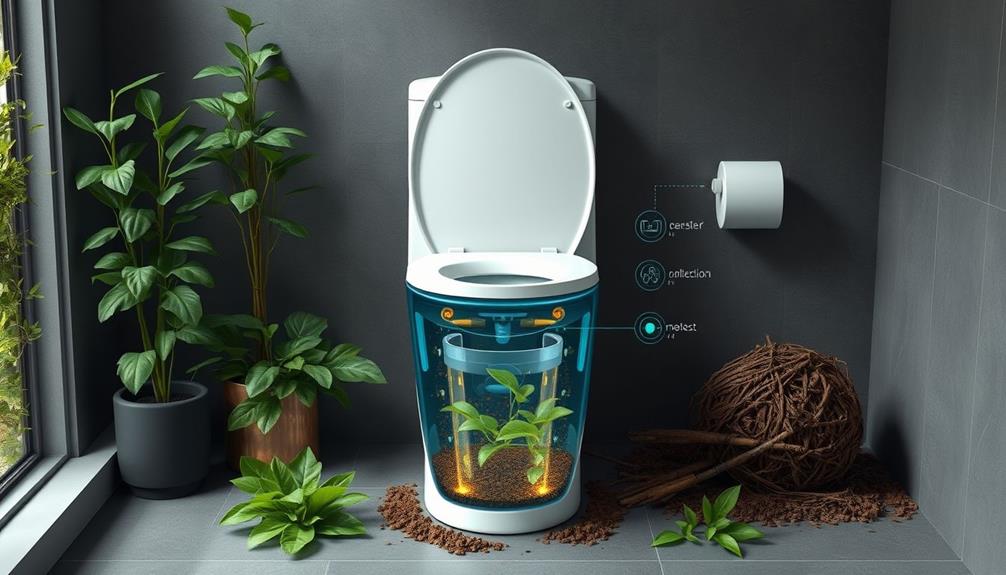
Imagine transforming your bathroom into a sustainable hub with a composting toilet that efficiently turns waste into valuable compost. Composting toilets utilize a chemical-free aerobic process to break down solid and liquid waste through the action of microorganisms and organic material. By separating these wastes, they enhance the composting process and greatly minimize odors, guaranteeing efficient waste management.
Additionally, eco-friendly materials used in pool construction align with the principles of sustainability that composting toilets embody, making them an ideal choice for eco-conscious homeowners.
Proper ventilation is essential; it supports adequate airflow, which controls odors and promotes microbial activity vital for composting. Many of these toilets are designed to be self-contained, requiring no water usage and eliminating the need for septic systems, making them perfect for off-grid living.
To optimize the composting process, regular maintenance is key. You'll need to add carbon-rich materials like sawdust to create the right environment for decomposition and guarantee the production of clean, safe compost.
This environmentally friendly approach not only reduces your carbon footprint but also contributes to a sustainable lifestyle. By embracing composting toilets, you're not just managing waste; you're participating in a greener future. Enjoy the benefits of a product that respects nature while providing a functional solution for your home.
Choosing the Right Composting Toilet

Selecting the right composting toilet is vital for creating an efficient and sustainable bathroom experience. To make the best choice, consider these key factors:
1. Capacity Assessment: Evaluate how many people will use the toilet and how often. You want a model that meets your household's needs without frequent emptying.
Additionally, understanding the essential items for a home cleaning kit can help guarantee that your composting toilet area remains clean and hygienic.
2. Installation Options: Check local regulations that could affect installation. Some toilets are designed for easy DIY setup, while others may require professional help, impacting your costs.
3. Ventilation Features: Proper ventilation is fundamental for odor control and effective composting. Confirm the model you choose has adequate venting to maintain a pleasant environment.
4. Initial Investment: Budget for the upfront costs, but also consider long-term savings on water bills and waste management.
Composting toilets often pay off through reduced operational expenses, contributing to a sustainable future.
Top Composting Toilet Options
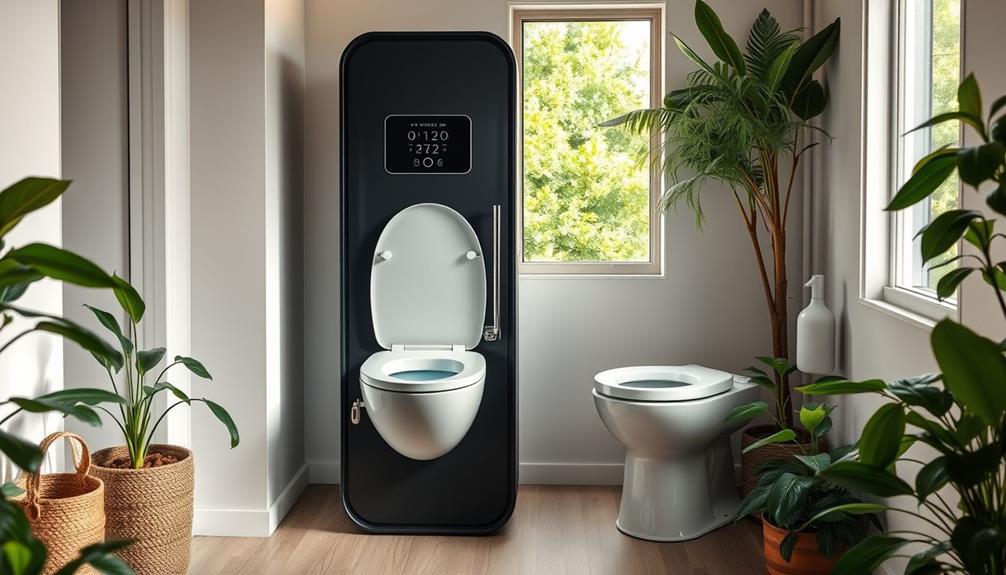
When it comes to sustainable bathroom solutions, choosing the right composting toilet can make a significant difference in your daily life. For environmentally conscious homeowners, options like the Natures Head Dry Composting Toilet offer a compact and durable design, perfect for small spaces and off-grid living, priced between $960-$1,020.
Converting to sustainable technologies, such as composting toilets, can lead to a more eco-friendly household and enhance your overall living environment, providing potential tax advantages for eco-conscious upgrades.
If you're looking for something that operates without electricity, the Sun-Mar Excel Non-Electric Toilet is an excellent solution for remote locations, ranging from $1,400-$1,600.
For low water usage, consider the Separett Villa 9215, which features a urine-diverting design to manage liquid and solid waste effectively, priced at $900-$1,100.
The Envirolet MS10 enhances composting efficiency with its low-energy fan, available for $1,200-$1,400.
Frequently Asked Questions
What Drawbacks Are Likely Associated With Composting Toilets?
When considering composting toilets, you'll find drawbacks like higher initial costs, regular maintenance demands, potential installation issues, and local regulations. Plus, colder climates might hinder effective composting due to slowed microbial activity.
Are Composting Toilets Environmentally-Friendly?
Yes, composting toilets are environmentally-friendly. They reduce water usage, minimize landfill waste, and convert human waste into nutrient-rich compost, enriching soil and promoting biodiversity, all while operating without harmful chemicals and maintaining public health standards.
What Is an Alternative to a Composting Toilet?
Consider a clever, clean alternative: the HomeBiogas Bio-Toilet. It transforms waste into renewable biogas for cooking, cutting down on water use and minimizing environmental impact, making it a smart choice for eco-conscious individuals like you.
How Do You Empty a Composting Toilet?
To empty a composting toilet, you'll need to remove the composting chamber. Wear gloves and a mask, then dispose of the fully decomposed waste in your garden or compost pile, following safety guidelines.
Conclusion
In a world where every drop counts, composting smart toilets emerge as the unsung heroes of eco-conscious living. By embracing these innovative solutions, you're not just flushing away waste; you're nurturing the earth, transforming refuse into resource. With their myriad benefits and seamless functionality, these toilets redefine sustainability in your home. So, take the plunge into a greener future—your bathroom can be both a sanctuary and a stepping stone toward a healthier planet, one flush at a time.
With an impeccable eye for detail and a passion for bathroom-related, Ava leads our editorial team gracefully and precisely.
Under her guidance, Best Modern Toilet has flourished as the go-to resource for modern bathroom enthusiasts. In her free time, you might find Ava exploring antique shops and looking for vintage bathroom fixtures to add to her collection.
Guides
The Rise of Smart Toilet Apps: Tracking Health and Habits on Your Smartphone
Harness the power of smart toilet apps to track your health and habits, but what secrets could they reveal about your wellness journey?
Smart toilet apps let you monitor your health and habits conveniently. These innovative devices analyze your waste, gathering essential data on biomarkers and health indicators. With real-time insights transmitted to your smartphone, you can track hydration levels, dietary habits, and even detect potential health issues early. The technology promotes proactive health management and offers personalized recommendations. Though concerns about privacy and data security exist, user acceptance is growing. As smart toilets evolve, they'll likely transform how you approach personal health care. Keep exploring, and you'll discover how this technology can revolutionize your wellness journey.
Key Takeaways
- Smart toilets utilize advanced sensors to monitor health metrics through waste analysis, providing real-time health insights directly to users' smartphones.
- They can detect critical biomarkers, enabling early disease detection and proactive health management for conditions like diabetes and cancer.
- User acceptance is high, with 98% valuing health alerts; however, concerns about privacy and data security hinder broader adoption.
- Integration with existing health apps allows for a holistic approach to health management, combining data for personalized health interventions.
- The market for smart toilets is expected to exceed $7 billion by 2027, reflecting a growing interest in health-conscious technologies.
Overview of Smart Toilet Technology
Smart toilets represent a groundbreaking fusion of hygiene and health technology. These innovative devices employ advanced sensors to analyze waste, allowing for real-time health monitoring every time you use them.
While you might think of toilets as purely functional, smart toilets are revolutionizing consumer electronics by passively collecting biological data, offering insights into your health. By integrating features such as efficient water usage, these systems not only enhance sanitation but also promote sustainability.
With capabilities to measure crucial indicators like heart rate, body temperature, and hydration status, these toilets provide valuable information for early disease diagnosis and chronic disease management. The data collected is securely transmitted to the cloud, where it can be analyzed for trends and potential health risks, such as diabetes and hypertension.
This level of health monitoring is a game-changer, offering an unprecedented opportunity for proactive health management. Innovations like optical scanning for automatic metric quantification and integration with digital health platforms further enhance the utility of smart toilets.
As consumer interest in health monitoring features grows, the smart toilet market is projected to exceed $7 billion by 2027, showcasing the shift towards a more health-conscious society.
Take note—these toilets aren't just a trend; they're a significant step toward a healthier future.
Health Monitoring Capabilities
Smart toilets are changing how you monitor your health by analyzing your urine and stool for critical biomarkers.
This continuous data collection can alert you to potential health issues like dehydration or chronic diseases, allowing for proactive management.
Additionally, incorporating a holistic lifestyle approach can further enhance your overall well-being.
With these insights, you can take charge of your health in ways you never thought possible.
Disease Detection Potential
Revolutionizing health monitoring, innovative toilet technology dives deep into disease detection potential by analyzing your urine and stool samples. With the capability to monitor biomarkers like glucose and protein levels, these smart toilets offer early signs of diseases, including cancer and chronic conditions.
Additionally, this advancement aligns with the importance of mental health support, as mental health support is essential for cognitive health maintenance. By keeping tabs on your health data, you can receive timely alerts for any abnormal conditions, supporting effective chronic disease management.
The integration of smart toilets with digital health platforms guarantees that your biological data is securely transmitted to the cloud. This enhances disease risk prediction, allowing for personalized health recommendations based on real-time trends.
Imagine having a tool that not only tracks significant indicators but also provides insights into your overall well-being.
As the smart toilet market continues to grow—projected to exceed $7 billion by 2027—its potential for transforming home health monitoring becomes even clearer. By promoting preventive care, smart toilets can greatly reduce healthcare costs while making sure you stay informed about your health.
Embracing this technology means empowering yourself with the knowledge needed for early intervention and better health outcomes.
Continuous Data Collection
The latest advancements in toilet technology enable continuous data collection that transforms how you monitor your health. Imagine using a smart toilet that automatically tracks essential signs like your heart rate, body temperature, and hydration status every time you sit down. This passive health monitoring takes place during your routine bathroom visits, providing you with valuable insights without any extra effort.
Maintaining a balanced diet rich in whole foods for peak energy can further support your health goals, complementing the insights gained from your smart toilet data essential foods for combating colds.
The data collected goes beyond basic metrics; smart toilets analyze biomarkers in your urine and stool, offering early disease detection for conditions such as diabetes, kidney problems, and even certain cancers. By transmitting this information securely to cloud storage, users benefit from ongoing health tracking and personalized recommendations based on their unique health trends.
Moreover, the integration of smart toilet technology with digital health platforms enhances accessibility for diverse populations, making health monitoring easier and potentially reducing healthcare costs through preventive measures.
As research shows, the market for these innovative toilets is projected to exceed $7 billion by 2027, reflecting the growing interest in their health tracking capabilities. Embracing this technology means you're not just using a toilet; you're proactively managing your health with every visit.
User Experiences With Smart Toilets

Users' experiences with smart toilets reveal a blend of convenience and complexity. While many users find daily interactions easy, design flaws and mismatched technology can complicate the experience. The potential for health monitoring is significant, with smart toilets capable of detecting conditions like dehydration or diabetes through unobtrusive data collection.
| User Feedback | Key Insights |
|---|---|
| Easy to Use | High user acceptance (98% value health alerts) |
| Design Flaws | Need for user-centered design |
| Data Sharing Willingness | Mixed willingness to share personal health data |
Many participants emphasize the importance of ownership and control over their health data, highlighting that user-centered design is essential for smart toilet applications. The study identified various use cases, from health condition signaling to biomarker measurement, indicating diverse user needs. Overall, while users appreciate the convenience and potential of smart toilets, their experiences underscore the necessity for thoughtful design and effective data sharing protocols to enhance user satisfaction.
Barriers to Adoption

When you think about adopting smart toilet apps, cultural stigma around discussing personal waste might make you hesitate.
Additionally, concerns about AI's potential raises concerns regarding privacy and how your sensitive health data will be handled can create further reluctance.
Plus, integrating this technology into your daily routine might feel complex and overwhelming.
Cultural Stigma Challenges
Cultural stigma surrounding toileting events can greatly hinder the adoption of smart toilet technology. Many people feel embarrassed discussing bowel habits, which can lead to underreporting health issues and limit their willingness to participate in health monitoring. For instance, in the U.S., only 15-30% of individuals engage in home stool tests for colorectal cancer screening, largely due to the discomfort associated with fecal matter. This reluctance can prevent you from fully exploring the benefits that smart toilet applications offer.
Additionally, the emotional volatility associated with health discussions can mirror the challenges faced when maneuvering relationships with individuals who've BPD triggers, making it even more difficult to address these topics openly.
Moreover, smart toilets are often perceived as "high-tech" or "medical" devices, creating a psychological barrier that deters potential users. You might prefer traditional methods, feeling that these innovative solutions are invasive or unnecessary. This cultural stigma can make it challenging to have open conversations about health monitoring, which is essential for informed consent regarding smart toilet technology.
To overcome these barriers, it's crucial to foster an environment where discussing health issues related to toileting is normalized. By doing this, you'll likely feel more comfortable participating and providing the necessary information to take full advantage of smart toilet innovations.
Privacy Concerns Impacting Adoption
Amid rising interest in smart toilet technology, privacy concerns greatly hinder its adoption. You might worry about sensitive health data being accessed by unauthorized parties, especially as reports indicate that cybercriminals may target these applications for data theft.
The potential for health data alteration poses another significant barrier; incorrect information could reach healthcare providers, compromising your safety. Additionally, the importance of user experience optimization can't be overlooked, as a seamless experience could alleviate some of these privacy fears.
Security breaches at companies managing health data have raised alarms, making you hesitant to embrace smart toilet technologies. Moreover, the fear that your health data could be sold to advertisers adds to your reluctance, leading to targeted advertisements based on your personal information. It's unsettling to think about how that data could be used without your consent.
Moreover, the real-time access to health data from smart toilets raises additional privacy concerns. Continuous monitoring of such sensitive information can feel intrusive, making you uneasy about adopting these technologies.
Until these privacy issues are effectively addressed, it's understandable that many people, like you, might hold back from integrating smart toilet apps into their daily lives.
Technology Integration Issues
Integrating smart toilet technology into your daily routine can be a challenge, as many people struggle to see how these apps fit into their established health management practices.
Technology integration issues arise when users can't easily incorporate smart toilet apps into their lives. You mightn't immediately recognize the benefits of tracking your health through these devices, especially if you're used to traditional methods. Additionally, individuals may exhibit a tendency towards self-importance that hinders their willingness to contemplate new health technologies, as seen in behaviors associated with narcissistic traits.
Privacy concerns play a significant role in this hesitation. If you're worried about sensitive health data being collected and shared, it's understandable that you'd be reluctant to adopt these technologies. The ethical issues surrounding informed consent and data protection further exacerbate this mistrust. You want to feel in control of your data, and if that's uncertain, why would you engage?
Cultural stigma also hampers open conversations about toileting habits, creating barriers to adoption. Many individuals find discussing such topics uncomfortable, affecting their willingness to explore smart toilet apps for health monitoring.
To overcome these hurdles, developers must prioritize user privacy preferences and create seamless integration within daily routines, ensuring that smart toilet technology becomes a welcomed ally in health management.
Privacy and Data Security

When it comes to smart toilet apps, concerns about privacy and data security are paramount. These apps collect sensitive health data, including biomarkers related to conditions like diabetes and urinary tract infections, raising significant privacy concerns.
As highlighted in recent discussions on user data vulnerabilities, you need to be aware of how your data is handled, as informed consent processes must clearly outline what information is collected, how it's used, and any potential incidental findings.
Regulations like the General Data Protection Regulation (GDPR) in the EU and the California Consumer Privacy Act (CCPA) enforce strict requirements on companies, ensuring transparency regarding data storage, sharing, and usage policies.
However, data breaches in the health sector are a growing risk. Cybercriminals may target smart toilet applications to steal personal and health information, making it vital for users to understand the risks involved.
While local anonymization and data deidentification practices are essential for protecting your privacy, advancements in technology increase the risk of reidentification of anonymized data.
As you consider using smart toilet apps, remain vigilant about how your data is protected and be proactive in ensuring that your privacy is prioritized.
Future Trends in Smart Toilets

As smart toilets continue to evolve, you can expect a surge in advanced health monitoring features that integrate seamlessly into daily life. The market for smart toilets is projected to exceed $7 billion by 2027, driven by consumer demand for personalized health insights and innovations in health monitoring technologies.
Expect to see smart toilets equipped with AI that can analyze biomarkers in urine and stool in real-time, vastly improving disease detection and chronic disease management.
Companies like Casana and OutSense are leading the charge, securing significant funding to develop these life-enhancing technologies. As these innovations unfold, regulatory measures will likely evolve to address privacy concerns surrounding the health data collected by smart toilets, ensuring better data privacy for users.
Collaboration between technology developers and healthcare providers will be crucial to maximize the potential of smart toilets in improving public health surveillance and early disease detection.
With these advancements, you'll not only enjoy a more efficient bathroom experience but also gain valuable insights into your health, making smart toilets an integral part of your daily routine.
Practical Applications and Benefits

Smart toilet apps are revolutionizing how you manage your health at home. These innovative applications leverage sensor data to track crucial health indicators like heart rate, body temperature, and hydration status. By automatically logging toileting sessions, they help you monitor conditions such as urinary tract infections and constipation more effectively than traditional methods.
Here's a look at some practical applications and benefits:
| Feature | Benefits | Application |
|---|---|---|
| Health Monitoring | Real-time insights | Track crucial signs |
| Personalized Health Recommendations | Tailored advice | Improve health management |
| Disease Detection | Early identification of issues | Analyze urine and stool |
| Data Integration | Seamless communication with providers | Enhance care strategies |
| User Convenience | Simplifies tracking | Reduces manual reporting |
These smart toilet apps not only enhance day-to-day health monitoring but also promote proactive health management. They facilitate improved communication with healthcare providers, especially for aging populations, allowing for timely interventions based on your unique health profile. With the capability for early disease detection, these apps represent a significant advance in personal health management.
Frequently Asked Questions
How Smart Toilets Can Monitor Health?
Smart toilets monitor your health by analyzing waste for hydration, glucose, and protein levels. They track crucial signs during use, allowing you to receive valuable health insights and early disease detection through data analysis.
What Are the Disadvantages of Smart Toilets?
Imagine a sleek throne that whispers secrets, but it's not all magic. You'll face cultural stigma, privacy fears, high costs, and tech frustrations that can leave you questioning whether this royal seat's worth it.
What Does the Smart Toilet Do?
A smart toilet analyzes your waste to measure health indicators like temperature and hydration. It monitors your biological data passively, enabling early disease detection while providing personalized health recommendations based on trends it collects.
What Is the Smart Toilet Urine Test?
Imagine a world where your toilet's smarter than your ex. The smart toilet urine test analyzes your urine for health markers, tracking hydration, glucose, and protein levels, helping you catch potential health issues early.
Conclusion
As smart toilet technology continues to evolve, you might wonder how it could transform your daily routine and health monitoring. With their ability to track essential health metrics and promote better habits, these innovative devices offer significant benefits. However, it's important to navigate concerns about privacy and data security. Ultimately, embracing this technology could lead to a healthier lifestyle—are you ready to take the plunge into the future of personal hygiene and wellness?
With an impeccable eye for detail and a passion for bathroom-related, Ava leads our editorial team gracefully and precisely.
Under her guidance, Best Modern Toilet has flourished as the go-to resource for modern bathroom enthusiasts. In her free time, you might find Ava exploring antique shops and looking for vintage bathroom fixtures to add to her collection.
-

 Guides3 months ago
Guides3 months agoThe Rise of Smart Toilet Apps: Tracking Health and Habits on Your Smartphone
-

 Guides3 months ago
Guides3 months agoThe Future of Bathroom Cleaning: How Smart Toilets Are Making Chores Obsolete
-

 Guides3 months ago
Guides3 months agoComposting Smart Toilets: High-Tech Solutions for Eco-Conscious Homeowners
-

 Guides3 months ago
Guides3 months agoSmart Toilets in Healthcare: Improving Patient Care and Monitoring
-

 Guides3 months ago
Guides3 months agoCultural Differences in Smart Toilet Adoption: A Global Perspective
-

 Guides3 months ago
Guides3 months agoThe Gamification of Bathroom Habits: How Smart Toilets Make Health Fun
-

 Guides3 months ago
Guides3 months agoEco-Friendly Materials in Smart Toilet Manufacturing
-

 Guides3 months ago
Guides3 months agoThe Psychology of Color in Bathroom Design: Choosing the Right Smart Toilet




